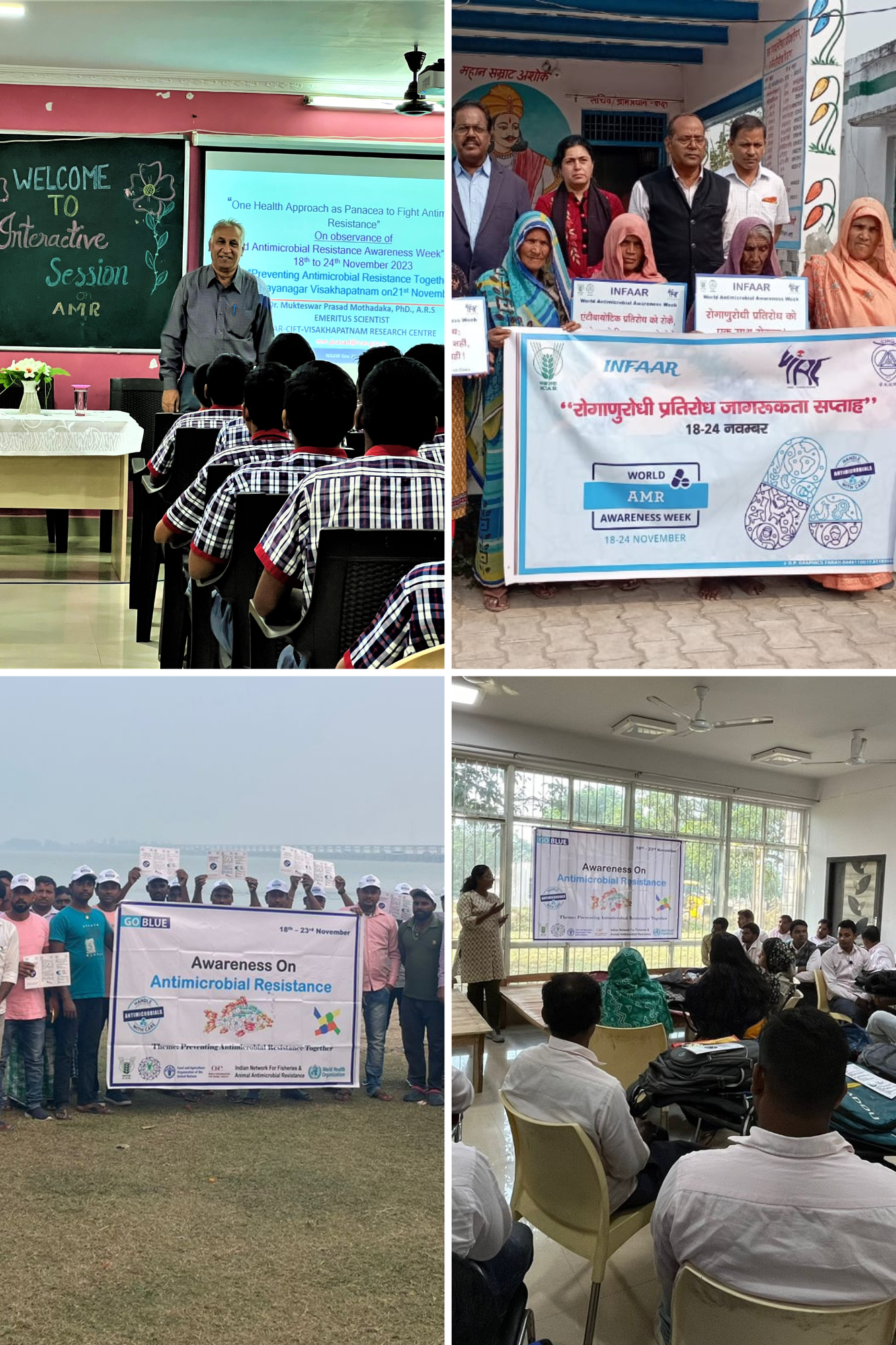Integrated approach essential to address Antimicrobial Resistance: FAO

The Food and Agriculture Organization of the United Nations (FAO) organized a series of events to observe the World Antimicrobial Resistance (AMR) Awareness Week from 18 to 24 November 2023. The theme of this year is ‘Preventing Antimicrobial Resistance Together’, which emphasizes the collaborative and multisectoral collaboration of various sectors while adopting the ‘One Health’ approach. FAO in collaboration with relevant stakeholders conducted several awareness programmes in different states in India targeting various audience groups.
Multisectoral Workshops and webinars on ‘Preventing Antimicrobial Resistance Together’
A one-day multisectoral workshop in collaboration with the Department of Animal Husbandry and Dairying, Government of India and ICAR, supported by USAID was organized on 24 November 2023 in New Delhi. The workshop facilitated active multi-stakeholder participation.
Takayuki Hagiwara, FAO Representative in India set the tone of the discussion on AMR calling for an integrated approach to address AMR. “We all live in one ecosystem and AMR is a part of it. FAO is undertaking a coordinated and multi-sectoral approach through the One Health approach and together with the Government of India aims to address the issue of the AMR in India”, he added.
The keynote addresses were delivered by Dr Lata Kapoor, Additional Director, National Cooperative Development Corporation (NCDC) New Delhi and Dr CG Joshi, Gujarat State Biotechnology Council. They informed the gathering on the AMR status in India from one health perspective and the relevance of genomic surveillance in veterinary sectors to better connect between sectors. Dr Joshi also explained how geonomic surveillance can generate high-resolution visual representation of AMR surveillance. He also shared information on an interactive webpage of the Government of Gujarat to understand the dynamics of AMR transmission across the one health sector.
The opening sessions were addressed by senior government officials namely Dr Neelam Patel, Advisor, NITI Aayog, Dr Abhijit Mitra, Animal Husbandry Commissioner, Department of Animal Husbandry and Dairying, Government of India, Dr JK Jena, Deputy Director General, ICAR, and Dr Rajesh Bhatia, technical expert. They echoed the need to create awareness and deliverables models for reaching out to communities, capacity building of farmers, and adopting innovative and alternative techniques to spread advocacy and awareness about the deleterious effects of AMR.
Dr Neelam Patel emphasized the need for ground-level efforts to be undertaken to address AMR and shared the willingness of NITI Aayog to associate with FAO to together address AMR at the policy level. Dr Mitra highlighted the need to introduce ethno-veterinary medicines in the veterinary curriculum to ensure alternatives to antibiotics and adopt a holistic approach to address AMR.
Dr. Rajesh Bhatia, technical expert in AMR discussed the danger of AMR and emphasized the challenges and gaps which need to be addressed to create awareness and capacity building in the AMR, especially in the livestock and aquaculture sector.
The workshop also conducted scientific panel discussions on crucial topics on animal health, fisheries, human health, environmental perspective and the role of communication and social science. The panel discussions underscored several key messages, emphasizing the urgency of an integrated strategy cutting across various sectors to effectively tackle AMR. Specifically, implementing antibiotic/antimicrobial stewardship practices in the Veterinary and Aquaculture sectors emerged as a critical step. Strengthening surveillance activities across all sectors, incorporating advanced genomic methods for a comprehensive understanding of AMR in India, was highlighted as pivotal. The workshop participants also recommended the dissemination of awareness programs and incentives for agriculture farmers and cattle owners, to discourage unnecessary antibiotic usage without proper diagnosis. Implementing better farm biosecurity measures and facilitating point-of-care diagnostics were identified as imperative measures. Lastly, there was a consensus on the critical need for infrastructural development, establishing robust laboratory infrastructure, and ensuring sustained funding for these endeavours to effectively combat AMR.
FAO also collaborated with the Indian Network for Fishery and Animals Antimicrobial (INFAAR) at various locations across India. It included in-person workshops conducted at the National Institute of Veterinary Epidemiology and Disease Informatics (NIVEDI), Central Institute for Research on Goats (ICAR – CIRG) and Indian Veterinary Research Institute (IVRI), webinars at the Central Institute of Brackishwater Aquaculture (ICAR – CIBA) and Sri Venkateswara Veterinary University, and outreach programmes in KV1 Vishakhapatnam and Aizwal Christian Academy School. Established by FAO in partnership with the Indian Council of Agricultural Research (ICAR), INFAAR is a national network comprising 21 veterinary laboratories in India. Over the years, FAO has provided technical support to these laboratories and consistently supported INFAAR’s initiatives aimed at raising awareness about AMR across the human, animal, and environment sectors.
AMR workshop at school
On 23 November 2023, FAO conducted a workshop at Ramjas International School to raise awareness among students to ensure that preventive measures are inculcated at a young age. A series of activities were undertaken which included presentations on the basics of AMR to make the students understand the implications of this growing threat, followed by slogan writing and quiz competitions. A storytelling session was also organized by FAO AMR experts, who shared their journey of becoming scientists and motivated students to pursue it as a career option. The workshop was attended by more than 100 students.
FAO plays a pivotal role in assisting governments, producers, and stakeholders to responsibly use antimicrobials. Keeping in line with the theme of ‘Preventing Antimicrobial Resistance Together’, FAO works to ensure that responsibilities are shared among livestock and aquaculture farmers, prescribers, policymakers in food and agriculture, and other sectors.
FAO undertakes a coordinated, multisectoral, One Health approach in all countries in the context of the 2030 Agenda for Sustainable Development to address AMR. Under the quadripartite arrangement, FAO works closely with the World Health Organization, World Organization for Animal Health, and the United Nations Environment Programmer to address AMR. The One Health response to AMR, spanning all sectors, can rescue millions of lives, safeguard antimicrobials for future generations, and secure our future against drug-resistant pathogens. Action against AMR is a race against time and we all must work together to assure and preserve the longevity of antibiotics.

